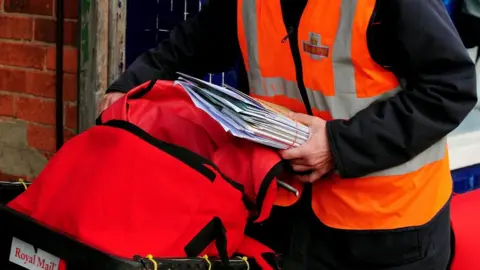Royal Mail to be investigated for missed delivery targets
 PA Media
PA MediaRoyal Mail is facing an investigation by the industry watchdog after it failed to meet its delivery targets over the past year.
Ofcom said it would consider whether any "exceptional events" explained why Royal Mail fell short.
But if there were no "satisfactory explanation", the regulator said it would consider imposing a fine.
The postal service delivered only 73.7% of First Class mail within a day - far short of the 93% target.
Ofcom said the impact of Covid was no longer "an excuse for poor delivery performance".
If Royal Mail is fined, it would be its second penalty since 2019 when it paid out £1.5m for failing to deliver first class letters on time.
A Quality of Service report from Royal Mail also showed it delivered only 90.7% of second class mail within three days, below a target of 98.5%.
A spokesperson for Royal Mail said it was "disappointed" with its performance, adding: "We will participate fully with any Ofcom's investigation."
"Ofcom takes quality of service very seriously," the regulator said. "In deciding whether the company is in breach of its obligations, we will consider if there were any exceptional events - beyond the company's control - that may have explained why it missed its targets."If it does not provide a satisfactory explanation and we determine that Royal Mail has failed to comply with its obligations, we may consider whether to impose a financial penalty," it said.
On Friday, Royal Mail's chief executive Simon Thompson announced that he would leave, meaning the company will soon be searching for its third boss in five years.
Royal Mail said its services had been affected by 18 days of strike action and that high levels of staff absence continued to hamper operations.
It said it hoped an agreement reached last month with Communication Workers Union (CWU) would resolve the matter and allow it to "rapidly improve" its services.
Royal Mail's chief operating officer Grant McPherson apologised to customers who were affected by the missed targets, but added the past year had been "one of the most challenging in [Royal Mail's] history".
"With the plans we have in place to drive service levels and reduce absence, we hope and expect to see further progress in the coming months," he said.
Royal Mail has previously said the strike action was costing £200m and could threaten its survival. In addition, in January the firm faced a ransomware attack which disrupted overseas mail for more than a month.
In March MPs on parliament's Business, Energy and Industrial Strategy Committee referred Royal Mail to the regulator following claims the firm was prioritising parcels over letters.
Royal Mail must, by law, deliver letters to all parts of the UK, six days per week, as part of its "universal service obligation", and prioritising parcels risked that, MPs said.
Politicians also questioned whether Mr Thompson had been "wholly accurate" in answers he gave to the committee earlier in the year.
They said there had been a significant number of complaints after Mr Thompson told the committee that Royal Mail did not use technology to track and discipline workers.
Royal Mail said it rejected the suggestion that Royal Mail "may have misled" the committee, and that the use of monitoring technology was to make sure workloads are "balanced and even".